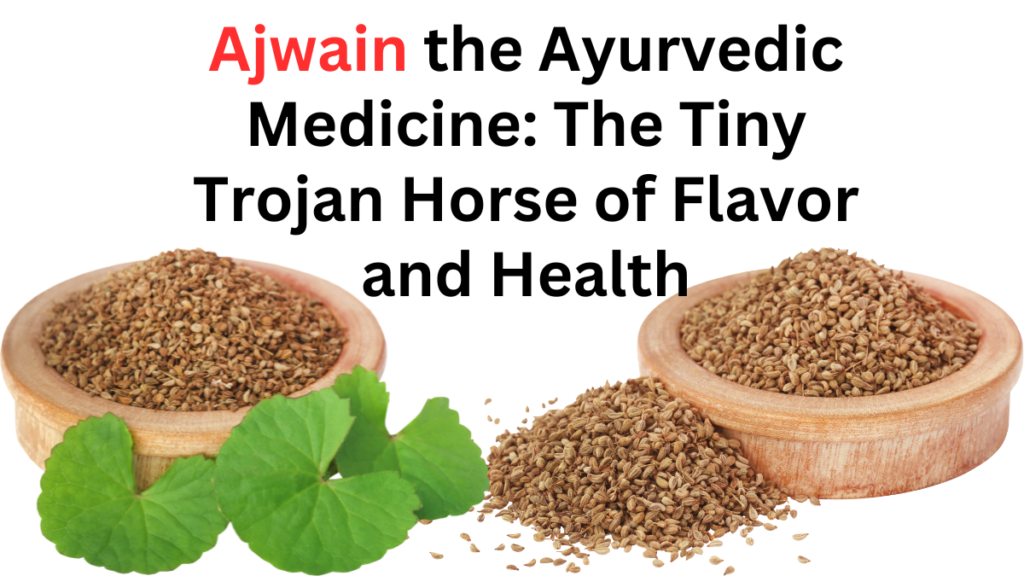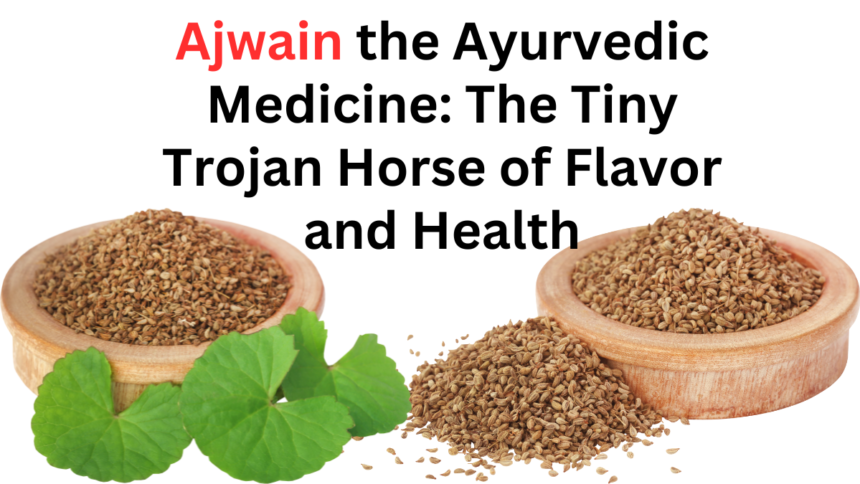Ajwain the Ayurvedic Medicine: The Tiny Trojan Horse of Flavor and Health
Introduction
Ajwain, a tiny but mighty seed with a big flavour, is a staple spice in Indian cuisine. But beyond its culinary uses, ajwain (also known as ajowan caraway or bishop’s weed) boasts a rich history as a medicinal herb. Let’s delve into the world of ajwain, exploring its origins, unique properties, and how it can be used in your kitchen and home remedies, Ajwain: The Tiny Trojan Horse of Flavour and Health.

A Plant with a Past
Ajwain, a member of the Apiaceae family alongside cumin and fennel, is believed to be native to Egypt. Cultivated for centuries across India, Pakistan, Iran, and the Mediterranean region, ajwain finds mention in ancient Ayurvedic texts for its therapeutic properties.
The Spice and the Seed (Well, Technically Fruit)
The part of the ajwain plant used is the fruit, though often referred to as a seed. These tiny, oval-shaped fruits pack a punch of flavor. Their bitterness is balanced by a complex aroma reminiscent of thyme and oregano, with a hint of anise. Ajwain is typically used whole, dry-roasted, or ground to enhance curries, dals, pickles, and even some breads.
Ajwain: A Natural Remedy
Ajwain’s traditional uses go far beyond the kitchen. In Ayurvedic medicine, it’s known as a carminative, aiding digestion and relieving gas and bloating. Ajwain water, made by soaking the seeds in warm water, is a popular home remedy for indigestion. The seeds are also believed to possess antimicrobial properties and may help with respiratory issues and coughs.
Adding Ajwain to Your Life
Ajwain is a versatile spice that can be easily incorporated into your cooking. Here are some ideas:
- Tadka Magic: Add a pinch of whole or roasted ajwain seeds to your tadka (oil infused with spices) for curries and dals.
- Veggie Boost: Sprinkle roasted ajwain over roasted vegetables like cauliflower, eggplant, or potatoes for an extra flavor dimension.
- Lentil Love: Add a teaspoon of ground ajwain to lentil soups or stews for a deeper, more complex flavor.
Important Note:
While ajwain is generally safe for most people in small amounts, it’s important to consult with a healthcare professional before using it medicinally, especially if pregnant or breastfeeding.
So, next time you come across ajwain at the spice market, remember – it’s not just a flavoring agent. It’s a tiny powerhouse with a long history and the potential to enhance both your cooking and well-being.
Frequently Ask Questions
What is ajwain?
Ajwain is a small, oval-shaped fruit (often called a seed) from the Apiaceae family, related to cumin and fennel. It has a strong, complex flavor with notes of thyme, oregano, and anise.
What are the health benefits of ajwain?
Traditionally, people use ajwain in Ayurvedic medicine for various purposes. Here are some potential benefits:
- Digestion: Ajwain may help with digestion, relieve gas and bloating, and act as a carminative.
- Respiratory issues: Ajwain may have antimicrobial properties and potentially aid with coughs and respiratory problems.
- Other benefits: Some believe ajwain may help with inflammation, cholesterol, and menstrual cramps. However, researchers need to do more research.
How to use ajwain in cooking?
Indian cuisine commonly uses ajwain, a flavorful spice. Here are some ideas:
- Tadka: Add whole or roasted ajwain to hot oil for curries and dals to create a flavorful base.
- Vegetables: Sprinkle roasted ajwain over roasted vegetables for a unique flavor twist.
- Lentils: Add ground ajwain to lentil soups or stews for a deeper taste.
Is ajwain safe for everyone?
Ajwain is generally safe in small amounts. However, consult a doctor before using it medicinally, especially if pregnant, breastfeeding, or with certain medical conditions.
What are some substitutes for ajwain?
If you can’t find ajwain, consider substitutes like caraway seeds, thyme, or a combination of cumin and fennel seeds. However, these won’t perfectly replicate the unique flavor profile of ajwain.
How to store ajwain?
Store ajwain seeds in an airtight container in a cool, dark place. Whole seeds will stay fresh for longer than ground ajwain.











